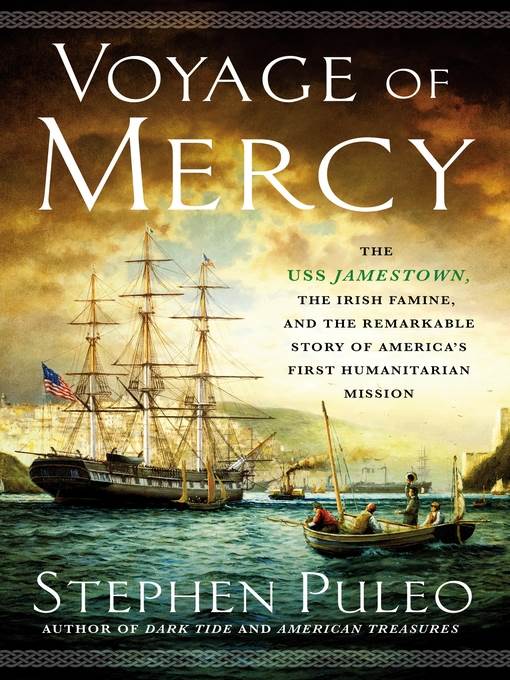
Voyage of Mercy
The USS Jamestown, the Irish Famine, and the Remarkable Story of America's First Humanitarian Mission
کتاب های مرتبط
- اطلاعات
- نقد و بررسی
- دیدگاه کاربران
نقد و بررسی

January 1, 2020
A historian focuses on a remarkable event in 1847 to illuminate a broader discussion about U.S. aid to other nations. In his latest narrative history, Puleo (American Treasures: The Secret Efforts To Save the Declaration of Independence, the Constitution, and the Gettysburg Address, 2016, etc.) begins in Ireland. As a famine caused by failed potato crops led to countless deaths, diseases, homelessness, and desperate measures to leave the country, American officials and other citizens were captivated by the plight of the Irish. However, at this time, the U.S. government had never become involved in what today would be termed "foreign aid." Furthermore, the logistics of how to gather money and food and how to transport the donations to Ireland were daunting--but not insurmountable. Puleo includes many exemplary individuals within the narrative, but there is one clear hero: ship captain Robert Bennet Forbes, an experienced seafarer who was inspired to do what he could to ameliorate the death and pestilence destroying Ireland. Throughout, the author portrays Forbes as unselfish in his motives, a man seemingly without ego. There is no doubting Forbes' heroism, as he left his family to risk his life to serve as captain of the USS Jamestown, a refurbished warship filled with lifesaving foodstuffs. The voyage from the Boston port to the Irish coast involved more than two weeks of rough waters and other perils. As Puleo shifts the focus periodically to Ireland, he writes about Theobald Mathew, a minister who tried to maintain hope among a dying populace while pleading with authorities in England to demonstrate compassion. While the narrative thread of English-Irish hostility could be a book on its own, the author effectively shows how "the events of 1847 have served as the blueprint and inspiration for hundreds of American charitable relief efforts since, philanthropic endeavors that have established the United States as the leader in international aid in total dollars." An uplifting historical account of humanitarianism with lessons in this increasingly isolationist time.
COPYRIGHT(2020) Kirkus Reviews, ALL RIGHTS RESERVED.

Starred review from January 1, 2020
The American impulse to do humanitarian good dates back almost two centuries to the 1847 sailing of the USS Jamestown. Congress ordered this warship's guns removed, transferred the three-masted vessel into private hands, loaded it with food and clothing, and sent it from Boston to Cork, Ireland, for relief from the devastations of the Irish Potato Famine. In Ireland, Theobald Mathew, a Catholic priest, had warned the British government of the dire situation, but London's political intransigence forbade substantive economic help. Mathew's correspondence vividly pictures Irish society's total collapse in the grim winter without food or heat. So the American proposal to send relief was the only promising path forward, and prominent politicians such as Henry Clay and Daniel Webster urged an act of American charity. Businessman and experienced seaman Robert Bennet Forbes was chosen to captain the Jamestown. His ship was just the first of a fleet that ultimately ferried tons of food and clothing to Ireland, most of it donated by American citizens from all religions and backgrounds. Puleo (American Treasures, 2016) makes this history compelling, and tells further American aid stories across the decades through the Berlin Airlift of 1948. Puleo's deep research is evident in an erudite bibliographic essay.(Reprinted with permission of Booklist, copyright 2020, American Library Association.)

























دیدگاه کاربران